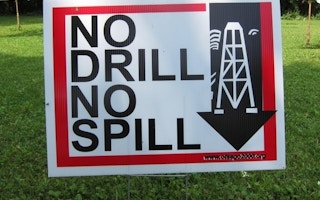Disposing of wastewater from hydraulic fracturing may make fault zones more prone to earthquakes, according to researchers from Columbia University and the University of Oklahoma.
The researchers found a “profound” increase in the number of earthquakes at three sites where wastewater from fracking was injected into the ground, said Nicholas van der Elst, a scientist at Columbia’s Lamont-Doherty Earth Observatory in Palisades, New York, and lead author of an article published today in the journal Science.
Oil and natural gas producers typically dispose of water and other fluids from fracking by injecting it into the ground. The report found that as subsurface rocks become saturated, fault lines in the area may become less stable, van der Elst said.
“This study helps show the link between the pumping and the earthquakes,” van der Elst said in an interview.
The report found that significant seismic activity elsewhere on the planet, sometimes even on other continents, may “induce” quakes in injection zones hours or days later.
“Seismic waves from the distant earthquake can squeeze the rock like a sponge,” he said. The researchers studied injection sites in Oklahoma, Texas and Colorado, and recorded “hundreds” of earthquakes in a year “where you might have expected a dozen.”
Injecting wastewater
Disposing of wastewater and other fluids by permanently injecting them into the ground may have a greater impact on fault lines than fracking, which typically involves pumping the liquids into the earth and then extracting them, according to the study.
More than half of the earthquakes in the U.S. in the past decade with magnitudes of 4.5 or more “occurred in regions of potential injection-induced seismicity,” according to the report.
“While the earthquakes are natural, relieving natural stresses, you’re making them happen in your lifetime rather than somebody else’s lifetime,” van der Elst said. “They can’t just be dismissed.”










